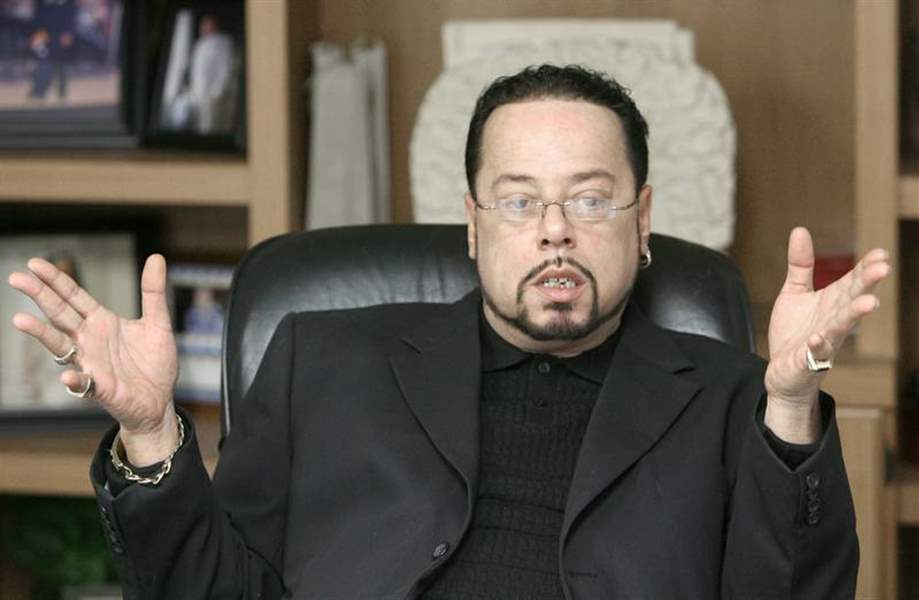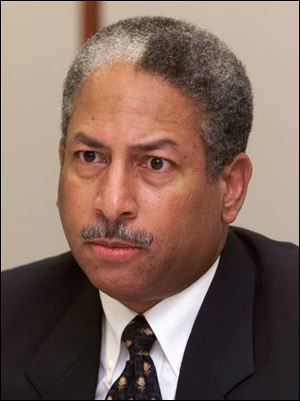
2 businessmen decry mayor's 'deadbeat' list
1/21/2007
For Daryle Parr, image is his business. As a target of the mayor's public lashing, Mr. Parr says the charge has hurt his reputation.

For Daryle Parr, image is his business. As a target of the mayor's public lashing, Mr. Parr says the charge has hurt his reputation.
With grafts, extensions, and hair plugs, Daryle Parr can restore a thinning scalp to its former glory. His reputation is another issue.
Appearances are critical to the 51-year-old stylist, who wears an onyx suit, pinky rings, and a beard trimmed to symmetrical perfection. "I have clients whose husbands have never seen them without their hair," he explains. "They have to trust me."
Toledo Mayor Carty Finkbeiner recently called Mr. Parr one of the city's "deadbeat dozen," a list of debtors the mayor alleged had failed to repay business loans owed the city. At a press conference, the mayor accused Mr. Parr of shirking on a $17,000 loan the city gave him in 1996 to open a hair salon. The claim against Mr. Parr - like one against another businessman whose name was removed just before the press conference, winnowing the list to 11 - proved false. Mr. Parr filed for personal bankruptcy in 2005; his debt to the city was legally erased. He started a new hair restoration business in West Toledo, which he says lost two customers after Mr. Finkbeiner's press conference.
On Jan. 12, the mayor privately sent an apology to Mr. Parr. The letter says "due diligence by city professionals failed to uncover the recent bankruptcy discharge." The mayor's apology misspelled Mr. Parr's first name.
As the silvering blond Mr. Finkbeiner grapples with a balding economy, he must balance his outspoken tenacity with an earnest stewardship of the city's long-term interests. The experiences of Mr. Parr and Robert Redmond, another member of the "deadbeat dozen," reflect the tension between these attributes.

Robert Redmond owes the city $88,863, a debt Mr. Redmond, a University of Toledo trustee, says he will repay.
Mr. Finkbeiner, in speaking to the media, slammed the 11 remaining on his list for the "inexcusable" offense of being among those "who simply took the money and did not make the effort to be a successful business person."
Neither Mr. Parr nor Mr. Redmond covets a fight with the mayor.
Both say they wish the mayor had contacted them directly to settle the matter, a sign the city cares as much about promoting entrepreneurship as it does headlines.
Katerina Bekyarska, a city spokesman, says there is no obligation to notify the subjects of a mayoral press conference in advance.
"When they're failed, we don't have a problem with shaming them and sending a message to the businesses that have not failed," Ms. Bekyarska says.
City Councilman Frank Szollosi says he applauds the mayor's enthusiasm for safeguarding taxpayer dollars but fears a "break-your-kneecaps" approach could deter businesses from sprouting in Toledo. He says the incident further demonstrates the need for a professional economic development director.
"Unfortunately, our economic development director is doing double duty as the mayor," Mr. Szollosi says.
Mayor Finkbeiner recently held another press conference to tout the city's economic development, citing progress in getting the Marina District site ready for a breakout year in 2007 and other efforts to attract business.
Toledo extends seven-year loans at 4 percent annual interest to companies using federal Community Block Development Grant money the city receives. The loans range from $6,500 to $300,000, with success measured in repayment and added jobs.
As of October, 2006, the city classified 41 recipients as repaying a total of $4.5 million in loans. It listed 16 companies as having uncollectible loans valued at $1.2 million and referred 31 businesses with an outstanding debt of $1.8 million to outside lawyers for collection.
About 22 percent of recipients eventually default, a category Mr. Redmond wants to avoid. Yet he says the mayor's announcement seemed to be aimed at him.
"Some of these individuals serve on very impressive boards and commissions here in Toledo and northwest Ohio," the mayor said on Jan. 2. "And shame on them."
An Army veteran who received a Bronze Star in Vietnam, Mr. Redmond is a University of Toledo trustee. He founded Technology Resources, an engineering services firm, in 1989.
His Summit Street offices are spartan, a workshop of ideas with one motivational sign posted above his desk: "There is a special place in heaven for the father of three girls."
In 1998, the city lent Technology Resources $102,000 to invent a radio antenna embedded into glass, a project launched on behalf of a Fortune 500 automobile company. The antenna automatically moves in the direction of a radio signal, improving reception in a skyscrapered city.
The loan represents a departure from much of Toledo's portfolio, which overwhelmingly favors restaurants, bars, and other businesses not based on industrial research.
Mr. Redmond still owes $88,863 in principal and interest. The city sued him for payment in 2003 and filed a separate suit in September for back taxes. After the 2003 judgment against him, Mr. Redmond wrote the city to reiterate his intention to repay the loan despite "unforeseen financial difficulties."
The promised consulting fees never materialized for the antenna project, which Mr. Redmond says cost in excess of $300,000. With revenue tight from swallowing the entire cost, paying the city would break his business.
Mr. Redmond says he must establish ownership of the antenna and find a buyer so he can settle the loan, a long process that involves patent law and sales presentations.
"The major issue is not the technology," he says. "It's where is the market?"
Mr. Redmond's question gets to the same dilemma Mr. Parr encountered with his salon, Parr Empact. The city's economic development program provided the money but not a network to help guide the businesses and maximize the taxpayer investment, Mr. Parr says.
Parr Empact closed within 2 1/2 years because insurance firms stopped covering hair replacement for chemotherapy patients, Mr. Parr says, a shift that reduced his cash flow to $15 cuts instead of $1,800 hair prosthetics.
A divorce followed the closing and pushed him into bankruptcy. Mr. Parr says he rebuilt his career because of his attention to personal relationships, one he says the mayor has forsaken.
Mr. Finkbeiner appeared at the ribbon-cutting ceremony for Parr Empact more than a decade ago. And Mr. Parr says he volunteered for Mr. Finkbeiner's 2005 campaign, yet the mayor never called about the loan before publicly lambasting him.
In the hair industry, at least, Mr. Parr says the key is to better people's lives and self-image without anyone noticing the full extent of your efforts.
"Your true skill," he says, "is judged by your ability to conceal your work."
Contact Joshua Boak at: jboak@theblade.com or 419-724-6728.